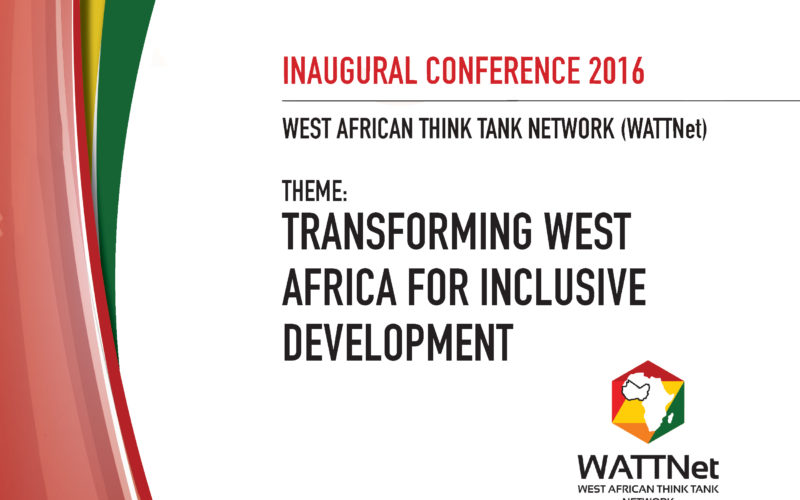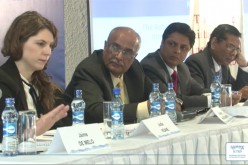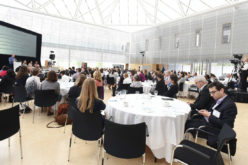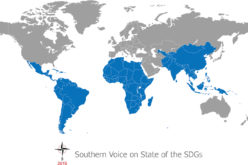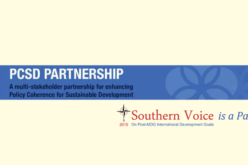The West African Think Tank Network (WATTNet) held its first conference on 1-2 March 2016 on the overarching theme Transforming West Africa for Inclusive Development. The conference brought together policy makers, think tank leaders, academia and business leaders to deliberate on the key policy issues confronting West African countries, so as to build consensus on the way forward.
John Asafu-Adjaye, Institute of Economic Affairs (IEA), Ghana; Debapriya Bhattacharya – Centre for Policy Dialogue (CPD), Bangladesh; Ibrahima Hathie, IPAR, Senegal, and Andrew Godwin Onokerhoraye, Centre for Population and Environmental Development (CPED), Nigeria were among the members from Southern Voice to contribute to the discussions on SDGs.
This publication contains the three papers emerging from the inaugural conference, which were authored by Southern Voice’s network members Debapriya Bhattacharya – CPD; John Asafu-Adjaye – IEA; and Chukwuka Onyekwena and Tirimisiyu F. Oloko, Centre for the Study of the Economies of Africa (CSEA).

Debapriya Bhattacharya
March 2016
At the United Nations (UN) General Assembly on 25 September 2015, member states \ adopted Transforming Our World: The 2030 Agenda for Sustainable Development (UN, 2015b). The agenda’s 17 Sustainable Development Goals (SDGs) and 169 targets officially came into effect on 1 January 2016 and will guide countries’ development policies over the next 15 years through 2030. On 15 January, a report of the UN secretary-general provided details on the follow-up and review framework for implementation of the SDGs, with the High-Level Political Forum on Sustainable Development (HLPF) at its core (see UN General Assembly, 2016).
The UN Statistical Commission then agreed to a set of 230 global indicators on 11 March (UN, 2016). These indicators were developed by the Inter-agency and Expert Group on SDG Indicators during a nine-month negotiation process. It is now time to look at country-level implementation and monitoring of the 2030 Agenda and various datarelated issues. This paper examines the challenges faced by countries in West Africa and makes recommendations on suitable policy actions going forward.

John Asafu-Adjaye
March 2016
Although countries in West Africa are richly endowed with abundant natural resources, to date they have achieved poor development outcomes. The high economic growth rates witnessed in the last decade have not resulted in a reduction in the high unemployment rates, particularly amongst young people. The economies of countries in the region have remained virtually unchanged with a focus on the export of low value added primary commodities. Growth in the manufacturing sector, which has the potential to absorb more young workers, has stagnated. Although some progress has been made in health and education, countries in the region still lag behind the rest of the world on the basis of various socioeconomic indicators. Given this background, the main aim of this paper is to analyse problems associated with natural resource management in West Africa with the view to identifying policy options to promote inclusive development.
From the analysis, the following policy options are proposed for achieving improvements in natural resource management in the region: (i) Transparency and accountability can be enhanced by making information on production activities and revenue flows freely available to the public; (ii) Transparency and accountability can be further enhanced by improving the institutional environment;(iii) It is recommended that the best way of improving governance in natural resource management is through legislation of the key aspects identified above; (iv) Dutch Disease effects can be mitigated with appropriate macroeconomic and microeconomic policies. Keeping some of the revenues offshore, while spending the remainder on carefully targeted expenditure programs (e.g., on infrastructural development) can meet the needs of current and future generations. At the micro (industry) level, Dutch Disease effects can be addressed by polices targeting investment to the affected industries (e.g., agriculture and manufacturing); (v) The Resource Curse can be turned into a blessing with a properly articulated expenditure program that is aligned with a national long-term development plan; and (vi) Involving key stakeholders in the oversight of the expenditure program can enhance efficiency and deter corruption.

Chukwuka Onyekwena and Tirimisiyu F. Oloko
March 2016
This study examines the potential of regional trade in facilitating the achievement of inclusive development in the West African region. It employs descriptive analysis to examine the nature, composition and dimension of ECOWAS trade within the group and with the rest of the world, vis-à-vis three other Regional Economic Communities (RECs) in sub-Saharan Africa (SSA). From the preliminary study, it can be observed that the growth rate of West African economies is increasing, but the rising economic growth does not translate to improvement in inclusive development, as there was no significant reduction in poverty levels in the region. Further evidence reveals that extraregional trade of the region is increasing at a very high rate, and also at a disproportionate rate with intra-regional trade, compared with SADC.
This indicates the existence of opportunity to boost regional trade for inclusive development through conversion of part of the extra-regional trade into regional trade. However, the study further finds that the region’s exports is dominated by mineral fuels, lubricants and related materials, and imports dominated by machinery, transport equipment, manufactured goods and chemicals, which implies that skilled technical manpower in the manufacturing sector must be available to effectively exploit the opportunity of trade for inclusive development in the region. Thus, the study concludes that, with the shortage of skilled technical manpower to boost the manufacturing sector in the region, achieving inclusive development in West Africa through regional trade might be difficult. It however recommends that West African countries should intensify investment in human capital development and re-invigorate their commitment towards regional industrial policy to foster higher regional trade and enhance inclusive development in the region.
1,562 total views, 1 views today


